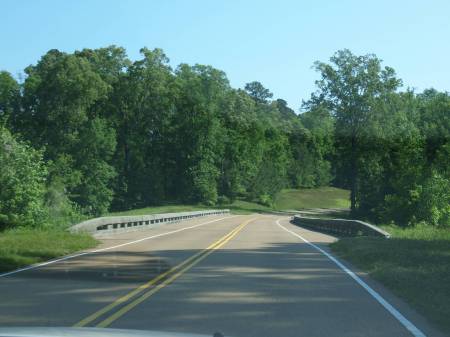 328 miles - 10-12 hours
328 miles - 10-12 hoursDrive on the scenic Natchez Trace Parkway from the southern terminus in Natchez, Mississippi to Tupelo, Mississippi. Following an old path used by the Natchez, Chickasaw and Choctaw Indians, then later by the French and Spanish and the boatmen who had traveled down the Mississippi in flatboats loaded with goods. The boatmen could not get their flatboats back up river so followed the Trace back to Nashville.
Travel through time on this southern stretch of the Trace, from ancient Indian mounds, to inns built to accommodate weary travelers to the birthplace of two contemporary celebrities- Oprah Winfrey and Elvis Presley. Enjoy the forest lined road with open meadows with patches of crimson clover. Watch spring come to Mississippi or the leaves turn in autumn. Whichever season, enjoy following in the footsteps of centuries of travelers.
Pick up a National Park Service map of the Natchez Trace at the Natchez Visitor Center or at a ranger station. Key points have signs, but more information is contained in the park brochure. And Civil War buffs might want to check out points on the Vicksburg, Mississippi - Civil War Loop and stop also at Port Gibson and Raymond along the Trace or take a detour to Vicksburg.
Here are some of the highlights to look out for along the way:
Natchez (starting point)
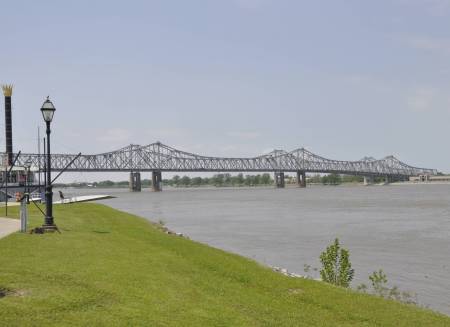 Natchez, right along the Mississippi River, has outstanding examples of antebellum architecture. Each spring and fall, private homes are opened to the public during Pilgrimage. A number of elegant mansions are open throughout the year as well.
Natchez, right along the Mississippi River, has outstanding examples of antebellum architecture. Each spring and fall, private homes are opened to the public during Pilgrimage. A number of elegant mansions are open throughout the year as well.Emerald Mound
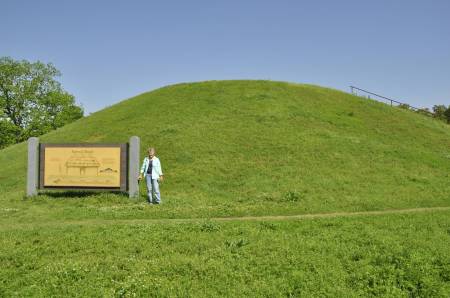 Emerald Mound is one of the largest Indian mounds in North America, covering eight acres. This ceremonial mound was built by the ancestors of the Natchez tribe around 1400. Earth was deposited along the sides of a natural hill, reshaping it into a plateau. Two other mounds were added. The larger (pictured) is 30 feet high. People farmed in the area but used the mounds for burials, temples and ceremonial structures. Archeologists believe intricate religious rituals were conducted there.
Emerald Mound is one of the largest Indian mounds in North America, covering eight acres. This ceremonial mound was built by the ancestors of the Natchez tribe around 1400. Earth was deposited along the sides of a natural hill, reshaping it into a plateau. Two other mounds were added. The larger (pictured) is 30 feet high. People farmed in the area but used the mounds for burials, temples and ceremonial structures. Archeologists believe intricate religious rituals were conducted there.Historic Mount Locust Inn and Plantation
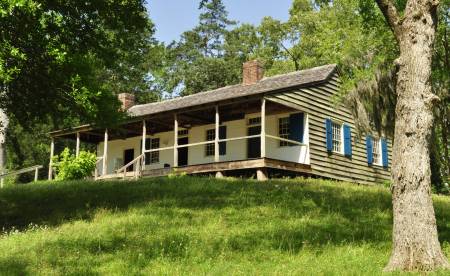 Explore Mount Locust Inn, one of the oldest structures still standing in the area. The original owner began building in 1780. It served boatmen, called "Kaintucks," who were traveling north via the Natchez Trace after having taken their flatboats down the Mississippi River to Natchez and New Orleans to sell their goods. Later, under new owners, it became a plantation. Tour the grounds as well to see the slave cemetery, the family cemetery and a brick kiln site.
Explore Mount Locust Inn, one of the oldest structures still standing in the area. The original owner began building in 1780. It served boatmen, called "Kaintucks," who were traveling north via the Natchez Trace after having taken their flatboats down the Mississippi River to Natchez and New Orleans to sell their goods. Later, under new owners, it became a plantation. Tour the grounds as well to see the slave cemetery, the family cemetery and a brick kiln site.Sunken Trace
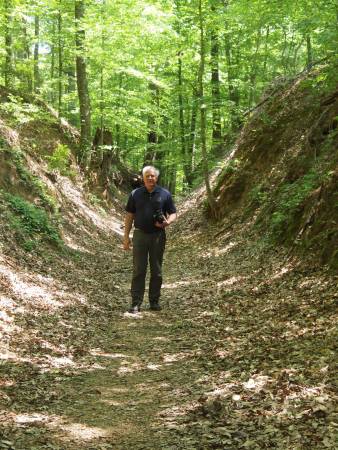
Walk a short portion of the original Natchez Trace though a deeply eroded portion of the trail. Short walk for a nice photo opportunity.
Cypress Swamp
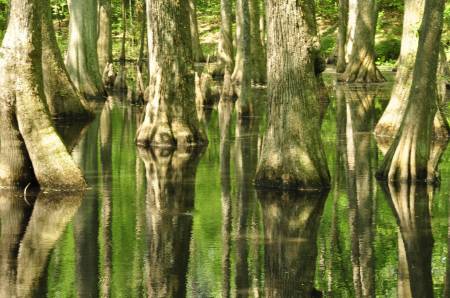 Follow a self-guiding, one-half mile trail on boardwalks through a water tupelo/bald-cypress swamp as you walk through Cypress Swamp. Keep your eyes open - you may spot turtles or even alligators sunning themselves on logs in the swamp! Nice place to stretch your legs and get photos on your travels along the Natchez Trace Parkway.
Follow a self-guiding, one-half mile trail on boardwalks through a water tupelo/bald-cypress swamp as you walk through Cypress Swamp. Keep your eyes open - you may spot turtles or even alligators sunning themselves on logs in the swamp! Nice place to stretch your legs and get photos on your travels along the Natchez Trace Parkway.Koscuisko- birthplace of Oprah
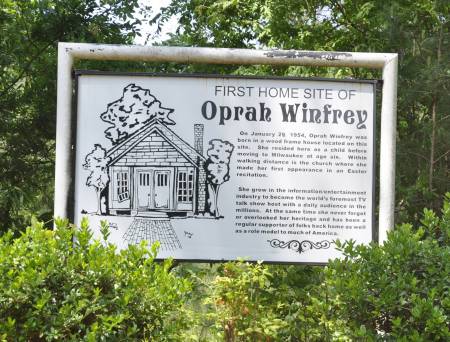 See the site where Oprah Winfrey was born, as well as the church where she gave her first recitation. In town, you can see the large, modern Boys and Girls Club she gifted to the city. Kosciusko also has a visitor center worth seeing with an exhibit of Tadeusz Kosciuszko, a Polish freedom fighter, the town's namesake. Kosciusko joined the Americans during the Revolutionary War and his fortifications contributed to an American victory at Saratoga. He later helped fortify West Point.
See the site where Oprah Winfrey was born, as well as the church where she gave her first recitation. In town, you can see the large, modern Boys and Girls Club she gifted to the city. Kosciusko also has a visitor center worth seeing with an exhibit of Tadeusz Kosciuszko, a Polish freedom fighter, the town's namesake. Kosciusko joined the Americans during the Revolutionary War and his fortifications contributed to an American victory at Saratoga. He later helped fortify West Point.French Camp
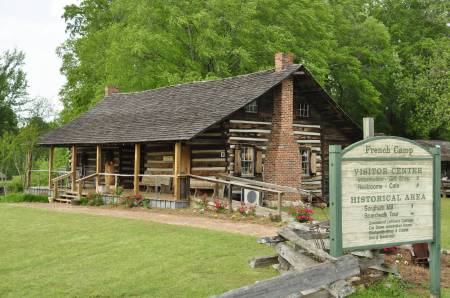 French Camp has a collection of historic buildings and is a nice stop when driving the Natchez Trace. It was established in 1812 and then used as a recruitment camp by Gen. Andrew Jackson. It includes an 1846 log cabin, visitors center, crafts and sorghum mill. Also on the grounds is an antebellum house, the Council House Café and a bed and breakfast.
French Camp has a collection of historic buildings and is a nice stop when driving the Natchez Trace. It was established in 1812 and then used as a recruitment camp by Gen. Andrew Jackson. It includes an 1846 log cabin, visitors center, crafts and sorghum mill. Also on the grounds is an antebellum house, the Council House Café and a bed and breakfast.Tupelo - birthplace of Elvis
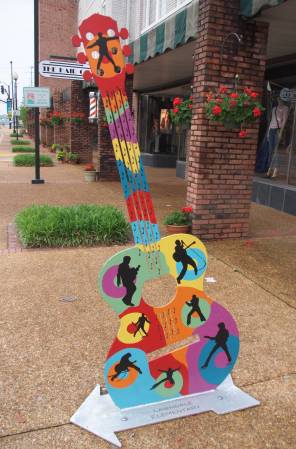 Walk through the tiny shotgun house where Elvis was born. Step into the church where he sang his first gospel songs and browse the exhibits in the museum. A number of outdoor displays also tell the story of Elvis' life. You can also pick up a copy of the "Early Years Driving Tour" and visit other sites in the area like the hardware store where Elvis got his first guitar.
Walk through the tiny shotgun house where Elvis was born. Step into the church where he sang his first gospel songs and browse the exhibits in the museum. A number of outdoor displays also tell the story of Elvis' life. You can also pick up a copy of the "Early Years Driving Tour" and visit other sites in the area like the hardware store where Elvis got his first guitar.





Message from RoadTrip America